PLC stands for Programmable Logic Controller. It is a digital computer used to control industrial machines. All the manufacturing industries, like the textile industry, food manufacturing plants, chemical industry, oil and gas sector, etc., use PLC to automate the production process. It uses the following programming languages:
- LLD (Ladder Logic Diagram)
- FBD (Functional Block Diagram)
- SFC (Sequential Function Chart)
- ST (Structured Text)
- IL (Instruction List)
The first three are the graphical languages and the last two are the text languages. If you are an engineering student and pursuing a course in PLC, this article will be beneficial for you because here, you will find the best free PLC simulation software to run on your PC.
PLC Simulation software for Windows 11/10
You can download these software on your Windows PC and practice by creating different logic diagrams. The best part of these software is that you do not require any external PLC hardware to run the simulation.
We have the following software on this list:
- OpenPLC Editor
- i-TRiLOGI
- WPLSoft
- Do-more Designer
- WTE PLC Configuration Tool.
1] OpenPLC Editor
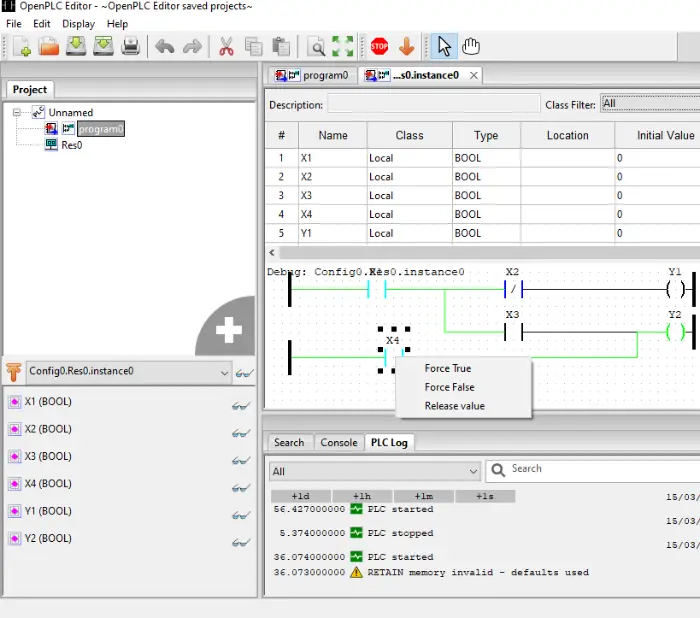
OpenPLCEditor is a freeware that is loaded with lots of features. It is a portable software, which means you need not install it on your PC. It is downloaded in the zip file. After extracting the zip file, open the respective folder and click on the “OpenPLC Editor” shortcut file to launch the software. It will take some time to open depending on the processor of your computer.
It offers you to write a program in any of the 5 PLC programming languages. To start a new project, click on “File > New.” Then write the name of your project and select the programming language and click “OK“. Do note that you have to create a new empty folder on your PC every time you create a new project. All the programming functions like on/off buttons, timers, counters, functional blocks, numerical operators, comparative operators, etc., are available on the right panel of the software.
Steps to draw a ladder diagram:
- To create a ladder diagram, first, you have to define all the variables and their types like boolean, integers, real, arrays, byte, word, etc. Click on the “Plus” icon in the middle panel. You can also set the initial value of all the selected variables.
- Right-click in the middle space, then click on “Add” and select power rail. This will add the rail on the screen.
- Follow the above step to add input contact variables, output coils, blocks (for the timer, counter, etc.), comments, etc.
When you are done, click on the “Start PLC Simulation” button on the toolbar. When you hover your cursor, you will see the names of all tools on the toolbar. If your ladder logic has any error, it will be displayed in the red color in the console tab. You can click on the PLC log tab for more details about the error. After clicking on the “Start Simulation,” you have to click on the “Debug instance” button in the bottom left panel and the simulation will be started. To perform an action like turning the switch ON, right-click on it and select “Force True.” To save your project, click on the “Save” button or press “Ctrl+S.”
2] i-TRiLOGI
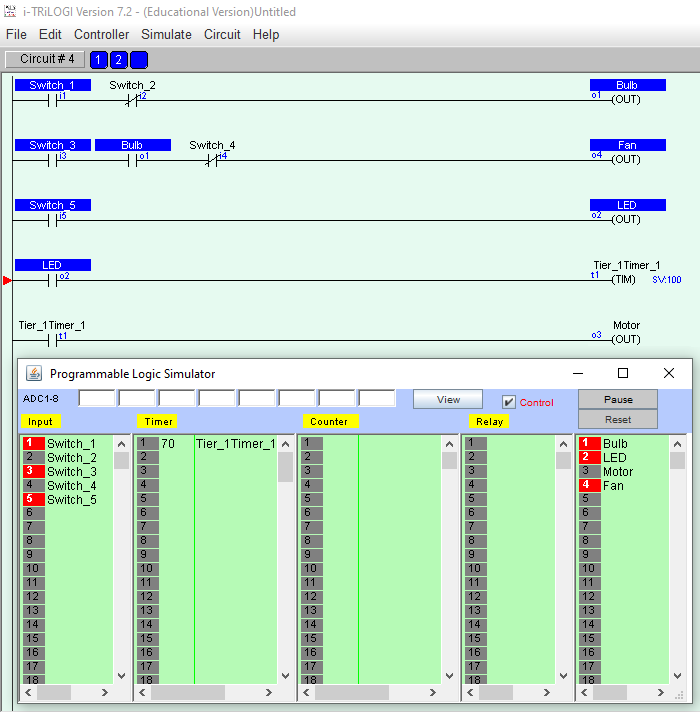
i-TRiLOGI is another freeware on this list by which you can practice ladder logic programming. The process of downloading this software is different. We have provided the link to their official website. After landing on their official website, fill the form provided and they will send you a download link on your email ID along with a password for installation. This software is completely free for educational purposes. The best part of the software is that it has a user-friendly interface and you will understand it easily.
After installing it, if you do not get its shortcut on the desktop, go to “C Drive > TRiLOGI Folder > TL7Edu Folder.” There you will get the exe file. Click on that file to run the software.
Steps to draw a ladder diagram:
- Like OpenPLC Editor, here, you also have to define the variables first. For this, click on “I/O Table” on the toolbar, select the I/O label from the drop-down menu. You can define inputs, outputs, timers, counters, relays, etc.
- After defining the variables in the I/O table, click on “Circuit > Insert Circuit” to add a rung. If you add contacts by left click, you will get Normally Open (NO) contacts and vice versa. Alternatively, you can also toggle the contacts by clicking on the respective button on the toolbar.
To start a simulation, go to “Simulate > Run (All I/O Reset).” You can change the values of the variables in the circuit by right-clicking in the simulation table. Click on the “Pause” button to stop the simulation. Go to “File > Save” or press the “Ctrl + S” buttons to save your project.
3] WPLSoft
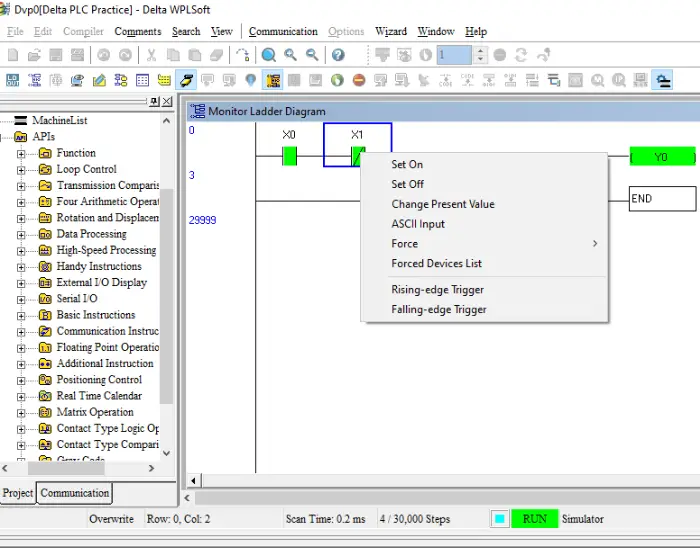
WPLSoft is a free PLC simulation software from Delta Electronics. If you do not find the software on the website, write WPLSoft in the “Keywords” section and select the highest version, then click on the “Submit” button.
WPLSoft is a fully-featured free PLC simulation software. You will find all the ladder logic functions here, such as bit logics (NO, NC, set coil, normal coil, reset coil), mathematical operators, timers, counters, comparators, hi-speed comparators, etc. If you are a working professional, you can download your project in Delta PLC by using this free software.
Steps to draw a ladder diagram:
- WPLSoft has a very simple user interface. First, create a new project by pressing the “Ctrl + N” button.
- All bit logic operations, like NO (Normally Open), NC (Normally Closed), coil, etc., are available on the toolbar. Click any of them to select.
- Now, define the address of your selected function and click on OK.
Unlike other software, here, you cannot start the simulation with just one click. First, you have to click on the “Simulation” button on the toolbar. You can read the names of each button by hovering your mouse cursor. After that, click on “Write to PLC” or press “Ctrl + F8.” A popup window will appear, click on OK to compile the program. Then, click on the “Ladder Start Monitoring” or press the “L” button. At last, click on the “Run” button or press “Ctrl + F11” and select “Yes.” This will start the simulation. To change the bit value, select it and press the right click of your mouse and select the desired option. To save the project, go to “File > Save” or press the “Ctrl + S” buttons.
4] Do-more Designer
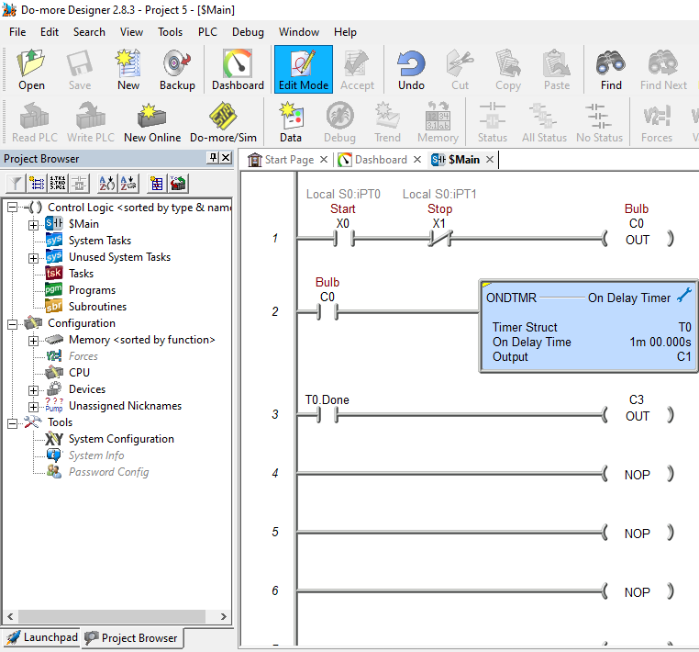
Do-moreDesigner is one more freeware in this list to simulate PLC ladder logic programming instructions. Like other PLC simulation software on this list, this one also comes with a user-friendly interface. You will find all the programming variables on the right panel of the software, including contacts (NO, NC, output coils, leading-edge, etc.), comparators, timers, counters, mathematical operators, strings, and more.
Steps to draw a ladder diagram:
- Go to “File > New Project > Offline Project” or simply press “Ctrl + N” keys. If the software asks you to select a PLC from the list, select Do-more Simulation because you do not have PLC hardware.
- Place the input and output variables on the rung from the right panel by the drag and drop method.
- Now, double-click on the placed variable and define its address. Here, X denotes the input and C denoted the output. When you are done, press “Ctrl + S” to save your project.
Defining the time in Do-more Designer’s timer is very easy. You will get different sections of hours, minutes, seconds, and milliseconds. Hence, you can enter the desired value easily.
To start the simulation, click on the “Accept” button on the toolbar. Then click on the “Do-more/Sim” button on the toolbar. It will launch a simulator window. Use this window to control your PLC program.
5] WTE PLC Configuration Tool
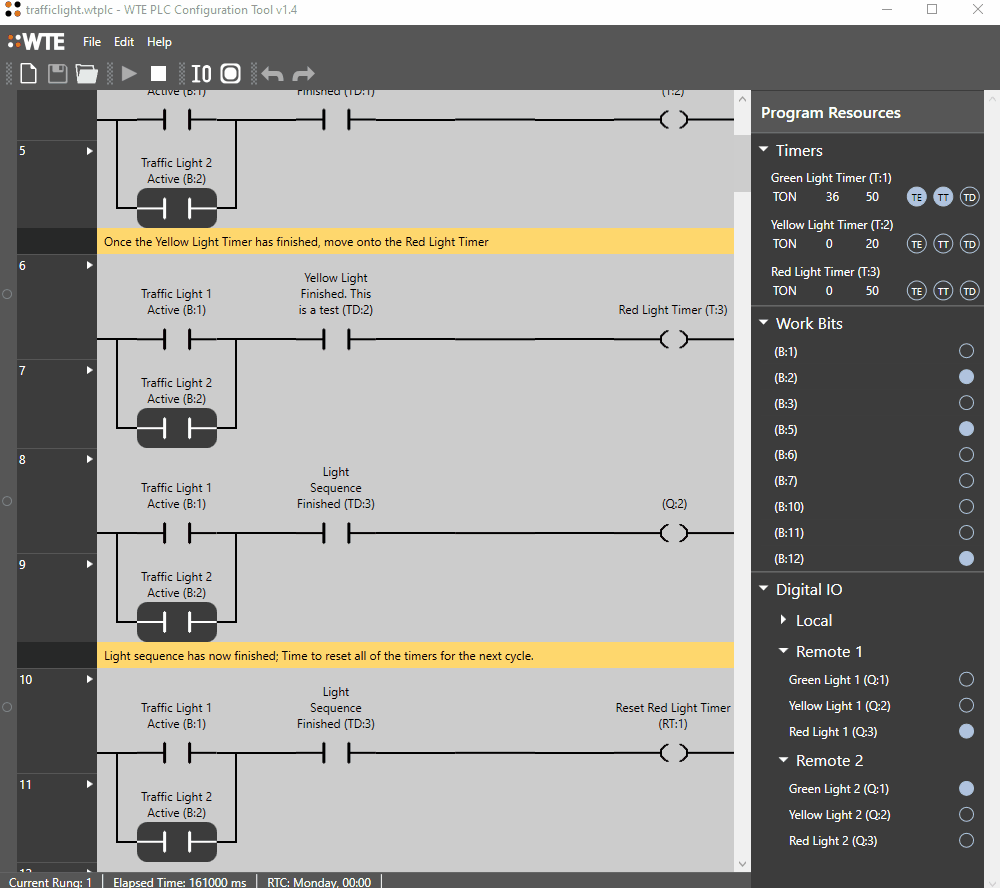
WTE PLC Configuration Tool is a free PC simulation software that comes with a simple user interface. You can use it to design simple to complex ladder diagrams. Timers, counters, comparators, memory bits, etc., are also easily accessible. After designing a PLC ladder logic diagram, you can run the simulation and view the output on the right pane. To download WTE PLC Configuration Tool, visit its official website.
Did we miss your favorite?
Leave a Reply